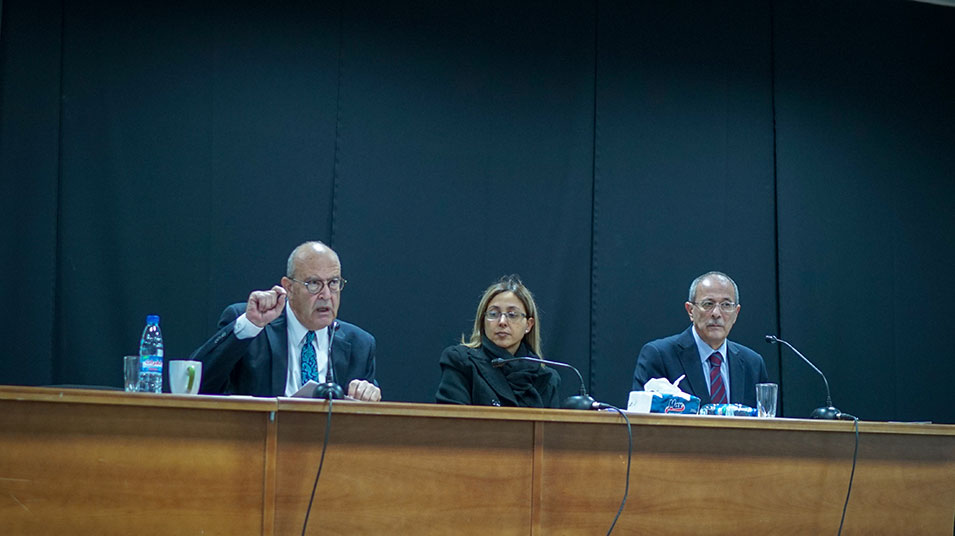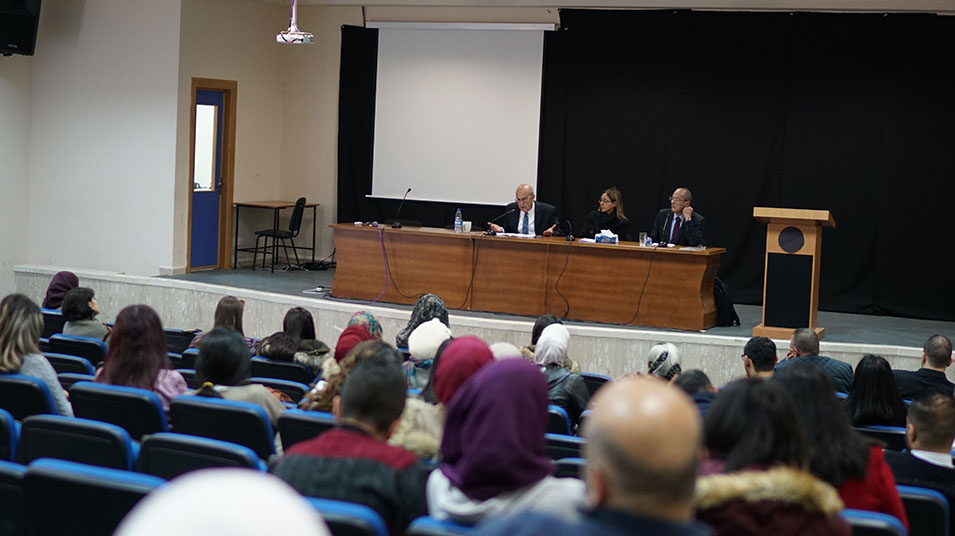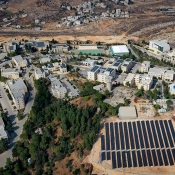Birzeit professors analyze Oslo Accords, ‘deal of the century’ in Ibrahim Abu-Lughod symposium
The Ibrahim Abu-Lughod Institute of International Studies at Birzeit University held a symposium on the impact of the Oslo Accords on the “deal of the century” and the relationship between them, on Saturday, November 24, 2018.
The symposium, entitled “The Deal of the Century: The Result or End of the Oslo Accords,” was chaired by Lord Habash, director of the Ibrahim Abu-Lughod Institute of International Studies, and featured Ghassan Al-Khatib, a professor of philosophy and cultural studies at Birzeit University, and Ali Jarbawi, director of the Master’s Program in International Relations at Birzeit University.
Al-Khatib, in his statement, said that there are two major misconceptions regarding the Oslo Accords. The first, he commented, that the media and people subsume the whole history of the peace agreements into the Oslo Accords, and disregard the peace agreements that came before it, such as the Madrid Conference of 1991.
The second misconception, he noted, is blaming the degrading Palestinian political situation on the Oslo Accords, while in fact there were three factors that led to such a situation. The first factor, Al-Khatib added, was the nature of the agreements signed post-Oslo. The agreements, for example, did not stipulate that the Israeli Occupation will stop settlement expansion in conjunction with the progressing peace talks.
The second factor, Al-Khatib said, lies in the Israeli Occupation not fulfilling the stipulations of the Oslo Accords themselves. The occupation, he remarked, reached a point of unilateralism, meaning attempting to force facts on the ground with complete disregard of Palestinians and of the Oslo Accords.
Al-Khatib noted that the third factor was the Palestinian side’s reaction to how the Oslo Accords were implemented and the related Israeli infractions and violations. He gave an example of Palestinians importing 100 percent of their cement needs from the Israeli Occupation for the first seven years following the Oslo Accords when, in fact, they could have imported cement from Jordan and Turkey as they are doing now.
As for the “deal of the century,” Al-Khatib observed that despite the U.S. administration not revealing any details, it was easy to see where it was heading due to the administration’s previous stance on issues regarding Palestine.
There were distinct changes with regards to the Trump administration’s attitude toward the Palestinian/Israeli conflict, Al-Khatib said, such as the lack of verbal criticism toward the Israeli policy of settlement expansion and moving the U.S. embassy to Jerusalem.
The “deal of the century,” opined Al-Khatib, was the final nail in the coffin for the Oslo Accords, noting that in the accords, it was agreed that the main issues of conflict - Jerusalem, the right of return, Israeli settlement building - would be negotiated; not unilaterally agreed upon. The U.S. however, being a signatory to the Oslo Accords, rendered the accords essentially void by unilaterally deciding on such delicate issues.
Jarbawi, however, took a different approach to the relationship between the Oslo Accords and the “deal of the century,” commenting that the relationship is not causal and noting that the “deal of the century” is a natural extension of the post-Oslo policies. He added that the “deal of the century” would not be the downfall of the Oslo Accords, as they were rendered void a long time ago.
The Oslo Accords were temporary agreements that govern a transitional period, Jarbawi said, which would lead to a final solution as per United Nations Security Council resolutions 242 and 338.
The accords, he added, rendered the relationship between the Palestinians and the Israeli Occupation horizontal, i.e., negotiating on an equal playing field. Extending the accords beyond the initial five years, however, returned the relationship to one where the Israeli Occupation dictated how Palestinians address all aspects of their lives and commanded how they deal with negotiations.
The “deal of the century,” Jarbawi commented, was the result of four factors: the changes in the regional and international balance of power, the lack of Israeli will to reach a settlement with Palestinians, the poor Palestinian performance in negotiations and reactions to implementation of agreements, and the Trump administration’s foreign agenda.
At the end of the symposium, the floor was given to the attending students and faculty members to ask questions and give supporting, or opposing, points to the arguments of the two professors.








